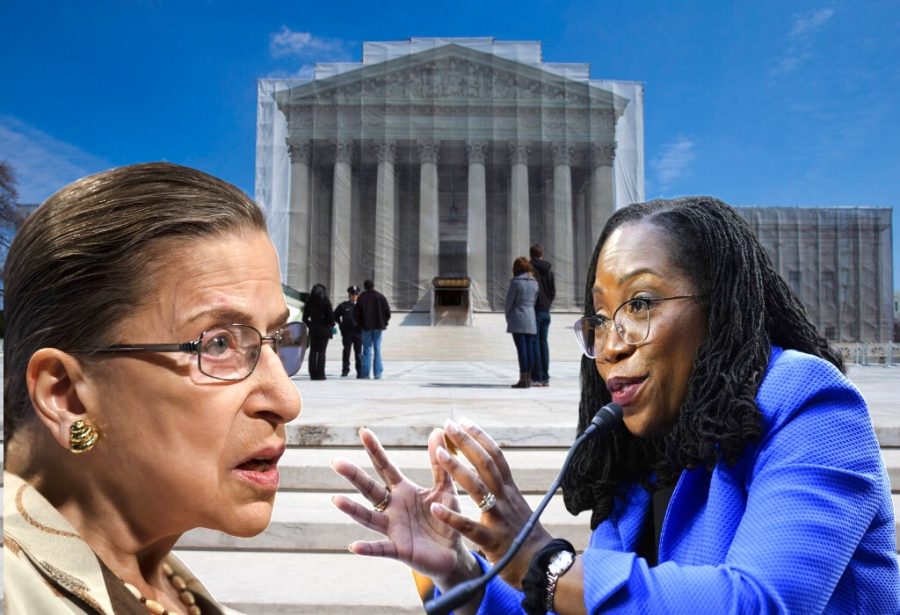Opinion: Supreme consequences
Ruth Bader Ginsburg (L) and Ketanji Brown Jackson (R) are both ground breaking Supreme Court Justices. But did one’s decision make things more difficult for the other?
Opinions expressed in the Op/Ed section of The Knight Crier are not necessarily reflective of the views of the entire staff of the KC.
Representing a monumental and groundbreaking moment in American history, as Ketanji Brown Jackson becomes the first Black woman to ever sit as a Supreme Court justice. Jackson has filled the empty seat of retiring Justice Stephen Breyer, conserving the 6-3 split on the court, with Democrats continuing to maintain their minority status. With this truly glass-ceiling shattering affair, the reminder of proper representation within the institutions that uphold this diverse country is proven more important than ever. However, the looming thought of the tumultuous path Jackson will face almost soils the hopeful essence her confirmation creates, as her career for the foreseeable future will be tasked with setback after setback due to conservative domination over the court she is tasked to reside with. It’s disheartening just to imagine that the impactful status of her career will be met with an overabundance of dissent due to this premise, yet that disheartening feeling lodges further when this inevitable scenario could have been prevented in actuality.
Facing calls for a timely retirement, Jackson’s predecessor, Justice Stephen Breyer, accepted the soft-spoken yet humble duty of resigning in wake of a new and young successor. For the preservation of his party’s current and foreseen power, Breyer made the astute decision of stepping down because he knew what his country, and the future he wanted his country to outrange, required in order to achieve such.
Calls like these, specifically revolving around the Supreme Court, can be dated back to as early as the institution’s inception. Most notably, however, were the infamous assertions directed at the late Justice Ruth Bader Ginsburg, in regards to the possibility of her retirement after President Barack Obama’s reelection in 2012. With the emerging possibility of a conservative Senate win foreseen in 2014, and Ginsburg’s declining health moreover, the stabilization of that court seat was vital for the conservation of the Democratic party’s successes of that era, and it was estimated that only her retirement could dictate such. In wake of these calls from the time period, Ginsburg, as the headstrong figure she was, declined.
Her actions to denounce any suggestions, or even questions, over her retirement were aimlessly commended by the ‘girl-boss’ cult she amassed, partly in thanks to the release of the biography The Notorious RBG, which eulogized her in ways a Supreme Court Justice should never be pedestaled, increasing her white-feminist following. Refusing to retire and cease her monumental career in wake of preserving the betterment of her party, and by definition to her notions, the betterment of the United States as a whole has proven to be reckless as predicted.
Aside from Ginsburg herself, implications of retiral paths for her were addressed with frivolous accusations of sexism by “followers” of RBG at the time, even though the circumstances as to why that was a plausible option were considered. Ironically enough, those that deemed these calls “anti-feminist” were subsequently met with the eventual replacement of Ginsburg years later at the hands of one of the most rightwing and sexist presidents to ever exist, furthermore leading to the endangerment of Roe v. Wade and other court decisions that protect the identities of marginalized individuals. Hindering the advancement of one’s own parties’ efforts in the face of their own self, career, and legacy-oriented preservation is not inherently feminist.
Aside from dooming the high court to at least another half-century of conservative domination, Ginsburg’s retirement plan, or lack thereof, proved its futility due to her untimely death in September of 2021. The figure to fill her position soon after, Justice Amy Coney Barret, has since proven her foundational opposition to the principles Ginsburg held dear throughout her career, and strengthened this conservative position. With Barret’s predominantly right-wing portfolio, her negative views on the subject of abortion and other matters like gay marriage that were uncovered during her Senate confirmation hearings in 2020, and most recently presiding in the recent decision to reject any blockage to the newly instated six-week abortion ban in Texas, it’s no understatement to assert progressive advancements are now ill-fated even further once they reach those marble steps.
The new face and viewpoint Justice Jackson brings to the bar will still have little effect to conserve or deem progressive prospects constitutional owing to this once-preventable super-majority, especially in wake of threats to Roe v. Wade that will be presented to the Supreme Court in the coming months through reviews under cases like the Mississippi Dobbs v. Jackson Women’s Health Organization, of which fundamentally considers an aim to ban an abortion after 15 weeks of pregnancy.


